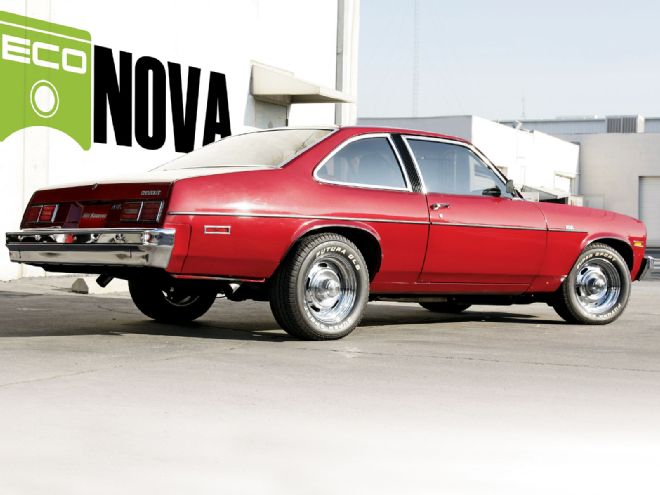
Progress is always good. Well, at least the final product is. Oftentimes though, the evolutionary starts and stops along the way to the ultimate goal feel like hindering steps backward rather than constructive steps forward. Case in point is the clunky '70s and '80s emission systems and fuel injection. These sought to embrace technology and usher in a new era of improved cars, but initially only created neutered versions of the previous generation's brawny muscle cars that were only marginally cleaner. Not our kind of progress.
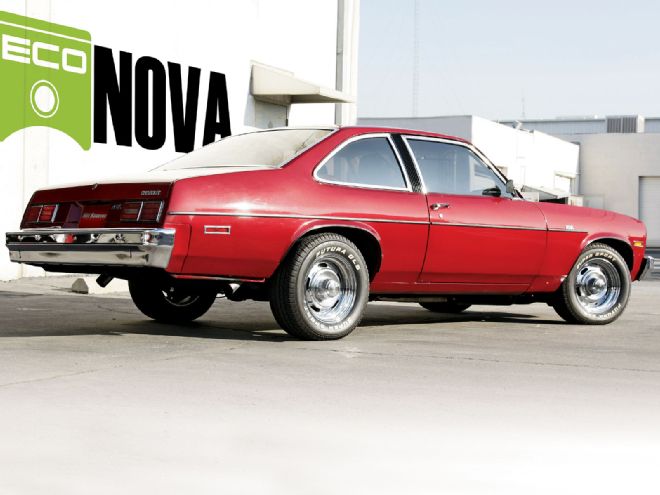 In 1976, the original 8.5:1-compression 305 ci in this Nova was rated for only 140 hp at 3,800 rpm and 245 lb-ft of torque at 2,000 rpm. Even the 350ci version only managed 165 hp. Oh how far we've come!
In 1976, the original 8.5:1-compression 305 ci in this Nova was rated for only 140 hp at 3,800 rpm and 245 lb-ft of torque at 2,000 rpm. Even the 350ci version only managed 165 hp. Oh how far we've come!
Of course, we all know how that eventually worked out; now we have naturally aspirated engines from the factory that easily make over 400 hp and blown ones that can reach into the mid 600s while retaining excellent driveability and passing emissions without air pumps. But what about all of those cars left in the lurch? It wasn't so long ago that even California favored a 30-year rolling smog exemption that was the hot rodder's saving grace for those cars, but that ceased in 2004 and was replaced by a mandate that all cars 1976 and newer (except cars less than 5 years old) must be smogged every other year with both a tailpipe and visual inspection. We could write another article on the bs contained in that decision, but for now those are the cards.
Nevertheless, with modern engine design and a little persistence, there's no reason you can't have your later-model car and more power. Even Cali allows engine swaps in anything, provided the engine is newer than the car, from the same weight class or lighter, and meets emission standards for the vehicle it was removed from. The problem is that it requires sourcing many parts and duplicating the newer car's emissions systems exactly, as well as dealing with stock ECU and PCM issues that could prevent a smog referee from passing it. Not necessarily easy. It's even worse for kit cars and custom builds that may be required to meet emissions for the year of their construction. That's where GM Performance Parts comes in with the revolutionary E-Rod package.
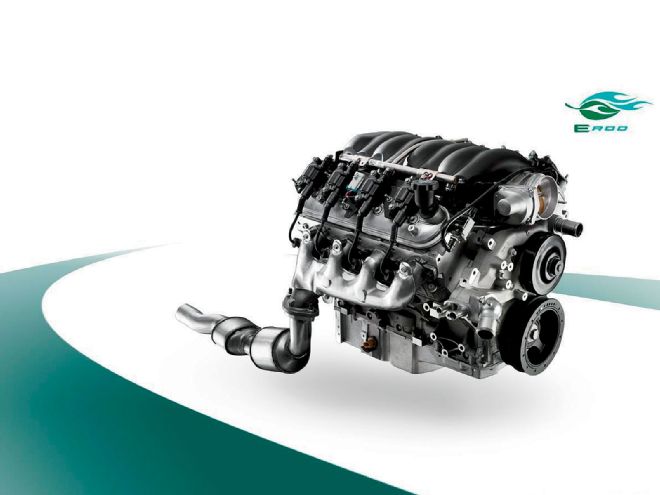 The engine that started the revolution is essentially the same LS3 found in new Camaros and Corvettes. But it doesn't end there; GMPP has already announced expansion of the E-Rod program to include the 315hp 5.3L, the almighty 505hp LS7 from the Z06, and even the blown 556hp Caddy engine known as the LSA.
The engine that started the revolution is essentially the same LS3 found in new Camaros and Corvettes. But it doesn't end there; GMPP has already announced expansion of the E-Rod program to include the 315hp 5.3L, the almighty 505hp LS7 from the Z06, and even the blown 556hp Caddy engine known as the LSA.
The E-Rod ethos is basically that there is no reason an essentially universal package based upon current production vehicles couldn't be developed and receive a smog exemption. Provided the kit is correctly installed, any car could be as clean and powerful as a new Camaro or Corvette. The parts already existed, so GMPP joined forces with SEMA and the California Air Resources Board (CARB) to ensure E-Rod-equipped vehicles are legal in California and other states that mirror CARB's recommendations and emissions standards.
To introduce the package, GM built a beautiful '55 Chevy. Don't get us wrong, we love the car, and we get the imagery of introducing the world to a new era of hot rodding in the same car that set it on fire with the original small-block Chevy. Plus, it shows any classic can be clean, but we think the major market for the E-Rod is a bit later in the lineage. That's why we've chosen a '76 Nova for our swap; this car represents a whole generation of neglected projects cast aside to avoid smog restrictions, as well as a sore spot for Californians since it happens to be the first year of required smog inspection. It's why GM created the E-Rod package to begin with. This Nova's story is much like many of its brethren; the choice was to either stay mostly stock with a few exceptions, or fly in the face of the law and hope to not be caught. Now we have a new and much more appealing option.
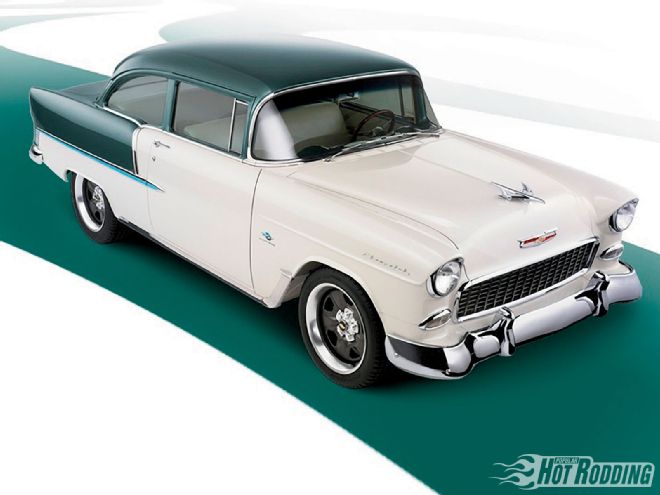 Any rod can be new-car clean, as GM showcased in the Clean Rod '55 Chevy. Odds are this isn't the swap you've got in mind for one of these babies, though.
Any rod can be new-car clean, as GM showcased in the Clean Rod '55 Chevy. Odds are this isn't the swap you've got in mind for one of these babies, though.
Plenty of E-Rods will likely be dropped in second-gen Camaros, so we also wanted to be a bit different while still keeping it relevant; the subframe in the '75-79 X-body Novas is essentially the same as a second-gen F-body Camaro and Firebird. So what are you up against when you decide to perform this swap? For now, we'll introduce you to the major E-Rod components and the EcoNova, but stay with us in subsequent issues as we walk you through the process all the way through the installation and certification. The pains will be worth it-even if you aren't yet subject to, or just don't care about smog restrictions. A GM-reliable, turnkey 430hp LS3 is a great powerplant for any vintage rod.
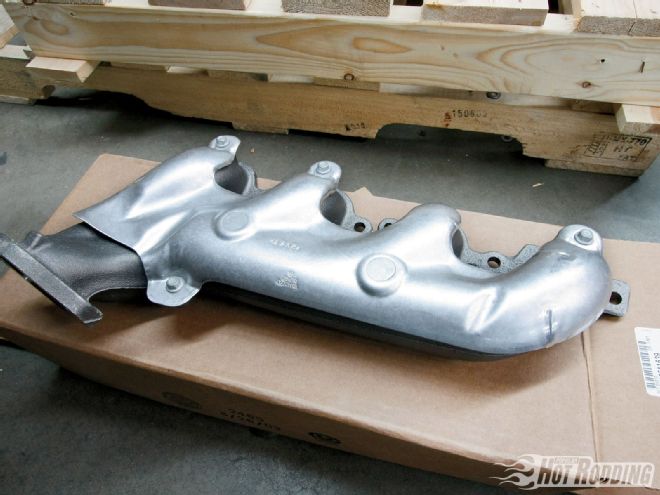 These '10 Camaro manifolds are the ones we need, and more than likely the right application for most swaps. Tubular headers would've been better for power and fitment, but keep in mind that to be street legal we need complete compliance to the factory spec.
These '10 Camaro manifolds are the ones we need, and more than likely the right application for most swaps. Tubular headers would've been better for power and fitment, but keep in mind that to be street legal we need complete compliance to the factory spec.
E-Rod Package Parts List
• 6.2L LS3 with 430 hp and 424 lb-ft of torque
• LS3 engine wiring harness
• Engine control module with emissions-legal calibration
• Catalytic converters
• Exhaust manifolds
• Oxygen sensors and sensor bosses
• Fuel tank evaporative emissions canister
• Air filter
• Mass airflow sensor and sensor boss
• Accelerator pedal (for use with the LS3's electronic throttle)
• Instruction manual
• Price? As low as $7,600